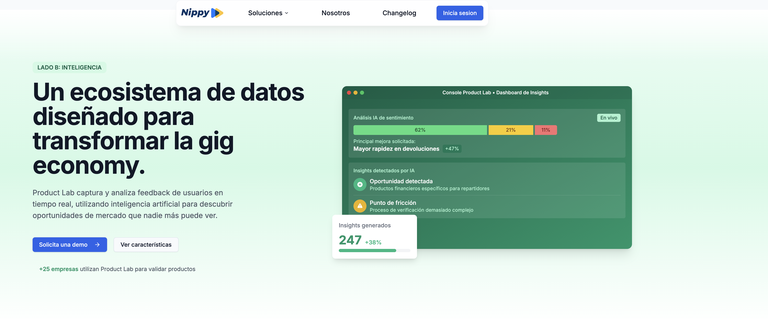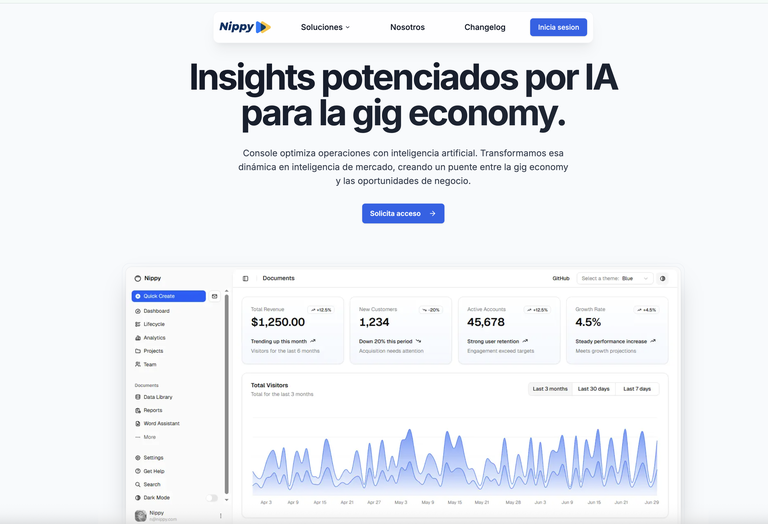
| Are you a Spanish speaker? The interview is also available in your language. |
Gig workers and flexibility are a match that is providing interesting insights into how the way we work and organise our time has been changing.
Currently, more than 150 million people worldwide depend on self-employment and digital platforms to generate income. The platform economy is a global reality, and WageIndicator has analysed it and run webinars on the topic, with specialists in the field presenting their insights.
WageIndicator and Nippy have been partners for the past year, working together towards the common goal of analysing information on wages, labour legislation and collective agreements in order to promote deeper labour equity and sustainable progress.
Nippy is an innovative platform offering benefits and support to independent delivery drivers, which has recently launched a new analysis tool.
We discussed the platform economy phenomenon with Diego Amondaray, Nippy's co-founder and CEO, and José Luis Tello, Nippy's CTO.
Diego: To put this in context, in Latin America, one in five workers belongs to this sector, driving an economy based on income, especially daily income, which is variable and carries a heavy burden of unpredictability. However, to provide further context, studies indicate that this digital and independent economy currently handles more than $ 45 billion in annual transactions, with projections reaching 1.2 trillion by 2032. These are individuals who generate income and conduct transactions on the go.
Gig workers and flexibility: an X-ray of the phenomenon in Latin America
With annual growth of over 25% in the digitisation of sectors, and high demand for financial solutions, insurance and benefits, Nippy has launched Console: a tool that uses AI to process data and gain insight into this phenomenon.
Diego: In this segment, we work within an ecosystem that brings together governments, platforms, and partners who want to access the segment but are unfamiliar with it. Above all, it involves the worker. In the first stage, we created a platform to provide benefits for independent or informal workers generating income through digital platforms in sectors such as telephony, insurance and health.
A key feature is that we provide a physical presence for a digital solution. From there, we opened Nippy centres, which today facilitate more than 300,000 interactions in Argentina, Santo Domingo, and Mexico City.
We are operating in Uruguay, Argentina, the Dominican Republic and Mexico with this base model, and we are currently in the process of developing solutions for the industry segment in debit, credit and prepaid cards, as well as financial products, in collaboration with Mastercard.
This year, we are making significant progress in this area with a substantial amount of core data. We have processed income data, behavioural data, dynamic data and hard data. We have processed earnings totalling over 20 million in an unknown industry, and we are making this data available to inform decisions relating to product creation, transactions and consumer habits. Over the last year, we have had almost three million interactions with users in four countries. We have evolved and grown, and this is just the beginning.

Why do gig workers prioritise flexible hours over pay and benefits, such as holiday allowance and bonuses?
Diego: Two recurring themes around the world are the freedom that comes with flexibility for gig workers, and the desire for a better income.
The ability to connect and disconnect at will is important to people today because they value time, a resource that cannot be replaced. For example, a worker may want to work eight, ten or twelve hours today and spend time with their family tomorrow.
Secondly, freedom to choose work hours, autonomy at work, and flexibility compensate for the fact that they offer a better income than jobs in a dependent relationship. We don't see benefits as something that interests workers much. In fact, to be fair, some benefits don't even have a direct impact on people.
For example, when we conduct focus groups at Nippy Centres in the Dominican Republic, we find that nobody would return to a job with set hours.
José: I worked closely with app workers in Mexico City. I worked in operations, and I believe that flexibility in non-traditional jobs is the most important factor for platform workers. I realised that it was everything to them. Mexico City is a huge city where you can work in many different sectors, not just the gig economy. You can do many different things and continue studying and preparing yourself. The paradigm shift that we are seeing on a global level is a complete change in how we understand work.
Are the governments in our region supporting this paradigm shift towards flexibility and the advantages of freelancing, or moving towards doing so?
Diego: I think there are signs that they support the changing mindset around freelancing and work-life balance. I think there are signs that they are supporting the change in mindset. We still lack the data to confirm this, as it is very difficult to be sure without data. However, there are signs that progress is being made in terms of work-life balance and life as a self-employed person.
From that perspective, I believe that the key players in this change of lifestyle are the platforms, which are obviously present at many dialogue tables. I would like to see more self-employed workers at the negotiating table so that we can understand what is happening and what benefits workers are or aren't interested in. We can regulate the market, but if we don't understand what is needed, it will be very difficult.
Gig workers and flexibility: a disruptive phenomenon that requires data to explain it
We now recognise the importance of data processing and analysis for understanding phenomena. The platform economy is no exception.
José: Each country behaves differently, but the verticals are the same. For example, consumption patterns in Mexico are different to those in Argentina due to different user behaviours. Within our ecosystem, we can profile user types. We also conduct qualitative profiling through surveys to gain insight into how these profiles behave within the industry. We have noticed substantial differences.
- In Mexico, for instance, we found that many of the self-employed drivers on these platforms use the job as a secondary source of income. We had long believed that this was the primary source of income, but we realised the opposite was true in Mexico. When we started investigating these job roles, we realised that some people use them as a temporary measure while they study, before moving on to a different job with more flexible hours. They use this work as a secondary source of income. Others in the highest percentile use it as their primary source of income.
- We also thought that their income was precarious, but this is not the case. For example, the highest percentile on these platforms earns three times the Mexican Minimum Wage, which is quite a lot considering the calibre of professions that exist today.
Diego: In places like the Caribbean and Santo Domingo, where there has been an influx of benefits and spaces like the Nippy Centre, 100% of workers would not return to formal employment with set hours. What does that mean? It means that, especially in vulnerable places like the Caribbean or informal places like Mexico, they come from previous employment relationships where they clearly earned less and had to stick to schedules. In the Dominican Republic, for example, a person could work in gastronomy and earn a maximum salary of US$300, but today, on platforms such as PedidosYa, Uber Eats or Uber In Drive, they can earn at least two or three times the Minimum Living Wage.
So, how do we put this whole puzzle together? We use our Nippy ecosystem to understand user consumption: what cards, educational benefits, and gamification do they use? This helps us to understand the whole segment and their concerns even better. We surveyed them to understand their needs, and found that they are not really a separate segment. They are just like us, with the same concerns, but with a different work dynamic. That's where it gets interesting. We have a global data architecture and APIs and providers that help us to understand user profiles in even more detail.
We have AI in our data centre that can answer your questions and generate code for in-depth analysis. Our data processing complies with the General Data Protection Regulation (GDPR), and we use artificial intelligence to process all data within our architecture. Who uses it? Platforms that want to see the degree of incentive, retention, and productivity. The platform that hires us has real-time access to behavioural data on users, freelancers, governments, and regulators. In other words, it provides anyone studying the segment with fully traceable market data on a dashboard, where they can collaborate and create reports using artificial intelligence.
These tools enable us to create much better regulations. This is part of Nippy's commitment to providing these tools, so that not only those who make decisions, but also those who create these opportunities, have visibility.

How do you see platforms working in the near future? Do you think they will continue to grow at the current rate? Or will it remain the same? Or will it change?
Diego: 'It is growing by 5% per year in this area and many others, such as professions and domestic employment. I believe that this growth will continue. People will have five or six income-generating opportunities with different platforms, and that will be very attractive to everyone.”
José: ‘I'm going to say something that might be controversial, but I think AI is going to transform the entire labour market. I've been doing this for a long time; I'm passionate about it. In the past, I worked with tech professionals; now, I work with delivery drivers. What do I see? We are heading towards a world where we will work to serve humans, and I feel this will completely disrupt this type of economy. We are going to start experiencing these changes, and I think it is already beginning to happen. At least in my role as CTO today, AI has allowed me to change the dynamics of my day-to-day work with the team, which is spread across three parts of Latin America. I have had to shift to managing both humans and robots, or bots. It seems crazy, but it's true and it's going to happen everywhere. I believe the gig economy will grow rapidly, and we will see markets emerge where you can hire human services.
We are already seeing some interesting changes, particularly in Mexico. With regard to regulation, we are going to see enhanced profiles to increase distribution and generate more profits. This will also probably lead to an interesting expansion of the delivery market. I think AI gives you more time to focus on other things. I no longer spend as much time searching because I already have the answer. I'm now going to use the hours I used to spend searching for something else, and I'll be more productive in other areas. This will happen everywhere and I think it will cause huge disruption. I think the market is going to change quite a bit, and the gig economy is going to grow even further. Nippy therefore has to be there to offer its benefits, ensuring that quality of life doesn't decline, and helping both people and governments with that transition.
To ensure you never miss insights like this, consider subscribing to the WageIndicator monthly gig newsletter.
Are you always on the go? Listening to the Gig Work podcast could be the best option for you.
You may also be interested in:
- Finding out more about the myth of automation and the fact that AI is, and will continue to be, dependent on cheap human labour, as discussed in the interview with Antonio Casilli.
- Exploring the Living Tariff for gig workers and freelancers, and finding out how it helps to calculate work-related costs and raise awareness.
